by Allen Reynolds, UrbanFaith Editor | Jul 18, 2021 | Commentary, Prayers & Devotionals |
 Summer is in full swing, and people all across the country have fired up their grills, purchased their summer wardrobes, and started traveling. For Black folks, summer often means family reunions (especially after the pandemic lockdown), barbecues (cookouts/kickbacks/get-togethers/BBQs), and finding things for the kids to do (like sports, activities, or playing outside). We all look forward to summer vacations, summer hours, and summer…denominational general conferences?
Summer is in full swing, and people all across the country have fired up their grills, purchased their summer wardrobes, and started traveling. For Black folks, summer often means family reunions (especially after the pandemic lockdown), barbecues (cookouts/kickbacks/get-togethers/BBQs), and finding things for the kids to do (like sports, activities, or playing outside). We all look forward to summer vacations, summer hours, and summer…denominational general conferences?
For whatever reason (probably the pandemic), 2021 has been the year of many denominational general conferences when the saints of God have gathered together to elect new leadership, hear inspiring teaching, and debate church policy. Some people are not looking forward to these conferences every few years, and many believers don’t even know they are happening. A lot of us don’t even have denominations to host conferences, and we’re fortunate if our church leadership gets together with other leaders to decide how to more effectively love God and love people.
But more than ever, people are actually hearing about these conferences, usually because of controversy. We have heard everything from debates about same sex marriage to whether systemic racism is real. We have seen rejoicing and anxiety over the appointment of new leaders, reports of how to handle abuse and instructions on how to handle finances. And many Christians ask, why are we having these conferences? Why are these issues being debated? Why aren’t we just doing what the Bible says?
 Well, we are actually doing exactly what the Bible says. The Bible is where we find the church resolving debates over contemporary issues and developing administration together in Acts 6, the commissioning of Barnabas and Paul (Saul) in Acts 13, and the first church-wide conference at Jerusalem in Acts 15. At that conference, the Gospel was articulated for Gentiles. Plus, we see Apollos teaching right doctrine after meeting with Priscilla and Aquila in Acts 18. There is no law in scripture for every situation, especially as the world changes and God continues calling us to follow Him. We need a relationship with God and the power of the Holy Spirit to lead us into all truth. It was the Pharisees and Sadducees who believed they could keep the letter of the law perfectly and had no need for God’s Spirit to lead them.
Well, we are actually doing exactly what the Bible says. The Bible is where we find the church resolving debates over contemporary issues and developing administration together in Acts 6, the commissioning of Barnabas and Paul (Saul) in Acts 13, and the first church-wide conference at Jerusalem in Acts 15. At that conference, the Gospel was articulated for Gentiles. Plus, we see Apollos teaching right doctrine after meeting with Priscilla and Aquila in Acts 18. There is no law in scripture for every situation, especially as the world changes and God continues calling us to follow Him. We need a relationship with God and the power of the Holy Spirit to lead us into all truth. It was the Pharisees and Sadducees who believed they could keep the letter of the law perfectly and had no need for God’s Spirit to lead them.
In the Old Testament, we read that before any major decisions were made, the kings of Israel sought wise counsel–not just as advice–but as wisdom from collaboration. The prophets, priests, and advisors would weigh in, and they would all pray to receive God’s wisdom for leadership. In the New Testament, we read that the apostles and elders were accountable to the community of believers and met together to pray and seek God’s guidance and receive instruction for the churches they led. None of these people were perfect.n the contrary, God met them with wisdom in the midst of their flaws.
We should continue to value church conferences and approach them with honor and hope. We cannot take for granted that many believers across the world cannot gather together publicly in general, let alone in large conferences. We should embrace and celebrate our opportunities to do so. If God was able to show up with wisdom for believers in the Bible, we know that despite our flaws and problems, God can show up for us with wisdom as well.
by Shalina Chatlani, WWNO | Jul 16, 2021 | Black History, Headline News |
In the 1960s, health care across the Mississippi Delta was sparse and much of it was segregated. Some hospitals were dedicated to Black patients, but they often struggled to stay afloat. At the height of the civil rights movement, young Black doctors launched a movement of their own to address the care disparity.
“Mississippi was third-world and was so bad and so separated,” said Dr. Robert Smith. “The community health center movement was the conduit for physicians all over this country who believed that all people have a right to health care.”
In 1967, Smith helped start Delta Health Center, the country’s first rural community health center. They put the clinic in Mound Bayou, a small town in the heart of the Delta, in northwestern Mississippi. The center became a national model and is now one of nearly 1,400 such clinics across the country. These clinics, called federally qualified health centers, are a key resource in Mississippi, Louisiana and Alabama, where about 2 in 5 people live in rural areas. Throughout the U.S., about 1 in 5 people live in rural areas.
The covid-19 pandemic has only exacerbated the challenges facing rural health care, such as lack of broadband internet access and limited public transportation. For much of the vaccine rollout, those barriers have made it difficult for providers, like community health centers, to get shots into the arms of their patients.
“I just assumed that [the vaccine] would flow like water, but we really had to pry open the door to get access to it,” said Smith, who still practices family medicine in Mississippi.
Mound Bayou was founded by formerly enslaved people, many of whom became farmers.
The once-thriving downtown was home to some of the first Black-owned businesses in the state. Today the town is dotted with shuttered or rundown banks, hotels and gas stations.
Mitch Williams grew up on a Mound Bayou farm in the 1930s and ’40s and spent long days working the soil.
“If you would cut yourself, they wouldn’t put no sutures in, no stitches in it. You wrapped it up and kept going,” Williams said.
When Delta Health Center started operations in 1967, it was explicitly for all residents of all races — and free to those who needed financial help.
Williams, 85, was one of its first patients.
“They were seeing patients in the local churches. They had mobile units. I had never seen that kind of comprehensive care,” he said.
Residents really needed it. In the 1960s, many people in Mound Bayou and the surrounding area didn’t have clean drinking water or indoor plumbing.
At the time, the 12,000 Black residents of northern Bolivar County, which includes Mound Bayou, faced unemployment rates as high as 75% and lived on a median annual income of just $900 (around $7,500 in today’s dollars), according to a congressional report. The infant mortality rate was close to 60 for every 1,000 live births — four times the rate for affluent Americans.
Delta Health Center employees helped people insulate their homes. They built outhouses and provided food and sometimes even traveled to patients’ homes to offer care, if someone didn’t have transportation. Staffers believed these factors affected health outcomes, too.
Williams, who later worked for Delta Health, said he’s not sure where the community would be today if the center didn’t exist.
“It’s frightening to think of it,” he said.
Half a century later, the Delta Health Center continues to provide accessible and affordable care in and around Mound Bayou.
Black Southerners still face barriers to health. In April 2020, early in the pandemic, Black residents accounted for nearly half of covid deaths in Alabama and over 70% in Louisiana and Mississippi.
Public health data from last month shows that Black residents of those states have consistently been more likely to die of covid than residents of other races.
“We have a lot of chronic health conditions here, particularly concentrated in the Mississippi Delta, that lead to higher rates of complications and death with covid,” said Nadia Bethley, a clinical psychologist at the center. “It’s been tough.”
Delta Health Center has grown over the decades, from a few trailers in Mound Bayou to a chain of 18 clinics across five counties. It’s managed to vaccinate over 5,500 people against covid. The majority have been Black.
“We don’t have the National Guard, you know, lining up out here, running our site. It’s the people who work here,” Bethley said.
The Mississippi State Department of Health said it has prioritized health centers since the beginning of the rollout. But Delta Health CEO John Fairman said the center was receiving only a couple of hundred doses a week in January and February. The supply became more consistent around early March, center officials said.
“Many states would be much further ahead had they utilized community health centers from the very beginning,” Fairman said. Fairman said his center saw success with vaccinations because of its long-standing relationships with the local communities.
“Use the infrastructure that’s already in place, that has community trust,” said Fairman.
That was the entire point of the health center movement in the first place, said Smith. He said states that were slow to use health centers in the vaccine rollout made a mistake that has made it difficult to get a handle on covid in the most vulnerable communities.
Smith called the slow dispersal of vaccines to rural health centers “an example of systemic racism that continues.”
A spokesperson for Mississippi’s health department said it is “committed to providing vaccines to rural areas but, given the rurality of Mississippi, it is a real challenge.”
Alan Morgan, CEO of the National Rural Health Association, said the low dose allocation to rural health clinics and community health centers early on is “going to cost lives.”
“With hospitalizations and mortality much higher in rural communities, these states need to focus on the hot spots, which in many cases are these small towns,” Morgan said of the vaccine efforts in Mississippi, Louisiana and Alabama.
A report from KFF found that people of color made up the majority of people vaccinated at community health centers and that the centers seem to be vaccinating people at rates similar to or higher than their share of the population. (The KHN newsroom, which collaborated to produce this story, is an editorially independent program of KFF.)
The report added that “ramping up health centers’ involvement in vaccination efforts at the federal, state and local levels” could be a meaningful step in “advancing equity on a larger scale.”
Equal access to care in rural communities is necessary to reach the most vulnerable populations and is just as critical during this global health crisis as it was in the 1960s, according to Smith.
“When health care improves for Blacks, it will improve for all Americans,” Smith said.
This story is from a partnership that includes NPR, KHN and the three stations that make up the Gulf States Newsroom: Mississippi Public Broadcasting; WBHM in Birmingham, Alabama; and WWNO in New Orleans.
Subscribe to KHN's free Morning Briefing.

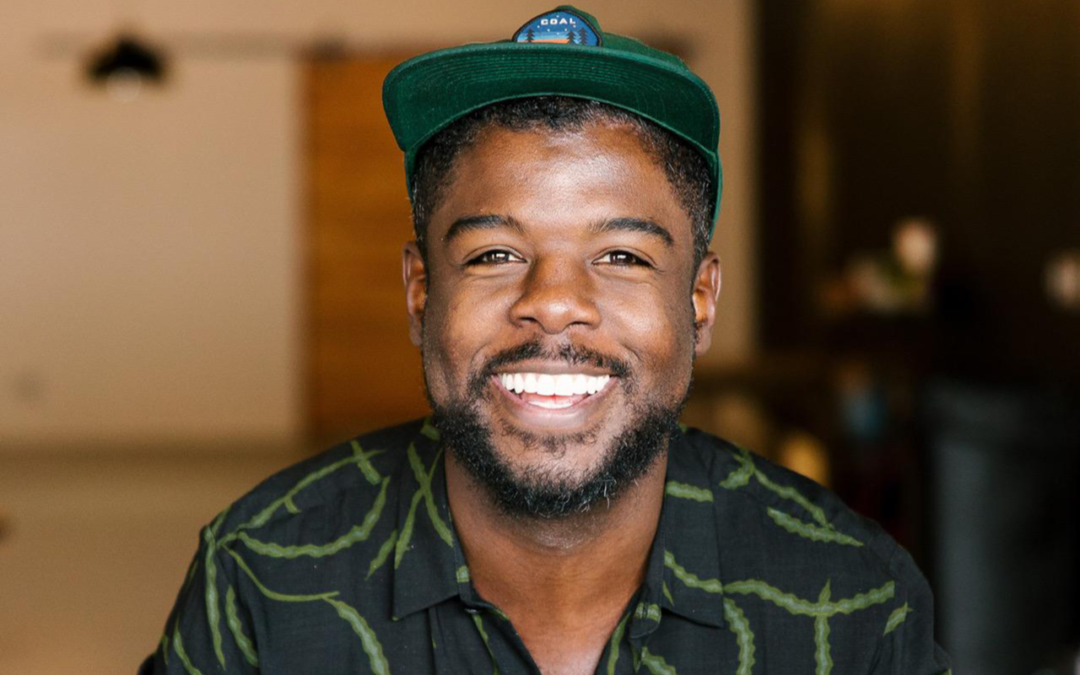
by Shari Noland | Jul 14, 2021 | Headline News |
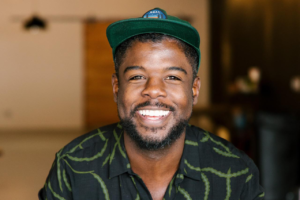 It could be daunting to take over the reins as lead pastor for a church your famous parents planted in 2012, but for Alvin Love III, 35, it was a natural progression that was initially inspired by a powerful encounter he had on a visit to Melbourne Life Church in Australia.
It could be daunting to take over the reins as lead pastor for a church your famous parents planted in 2012, but for Alvin Love III, 35, it was a natural progression that was initially inspired by a powerful encounter he had on a visit to Melbourne Life Church in Australia.
“It was something that was just surprisingly personal and I guess invasive a little bit. I felt like God was looking at me and only me. And that was the first time for me to where I just felt that much attention and that much focus from God and it stopped me in my tracks. I was only planning on staying in Australia for three months. I decided to stay nine months because the discipleship course that the church offered was a nine-month class,” said Love.
From that encounter, Love began sharing his experience with his friends and family and what he felt was in his heart. He learned that a number of his friends were also taking steps to a deeper connection with God. Over the next year, pastors and leaders from Melbourne Life Church came to Nashville and ministered to him and his friends at his parents’ home. It was their ministry that launched Nashville Life Church with 38 members and Pastors Alvin Love II and CeCe Winans as Senior Pastors. Now, in 2020, with about 400 members, he and his friends are leading the congregation. Although some changes are happening, they are learning as they go.
“I’m very different from my parents, but our church has been a collaborative effort. My dad and mom brought me pretty close to the core of what was happening. So though I was never the leader from a governmental and even spiritual point, I’ve always had a prominent voice in the building of the culture and what we have. I think the change is less because I’m in charge and more because I’m evolving and we’re getting better and better,” said Love.
It’s a multicultural church and very diverse in a lot of ways; not just racially, but politically, philosophically, and economically. As would be expected, that naturally has caused some division within the church that Love has had to address head-on. Rather than pick a side or using his platform to speak politically, he emphasizes not letting politics divide the church.
“There’s always been Democrats and Republicans. There’s always been all types of people, and that’s okay. I don’t think that your Christian faith has to dictate where you lean politically, however, as believers, we should never let politics serve as a tool to divide the church that God has called to be one,” said Love.
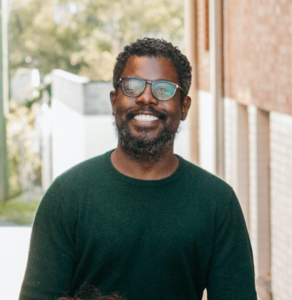 So what does he believe they should be focused on? What Love says are the “basic beliefs — being a community of faith amidst the social, health, and political unrest. They had to do things a little differently with COVID. Previously, they’d gather more with 12-week small groups. Now, they’re focused on being a source of life and faith for people wherever they are, whether at work, in the neighborhood, or elsewhere. He encourages his members to reach out to people who aren’t part of their church community, or perhaps they’re at the edge of not believing at all.
So what does he believe they should be focused on? What Love says are the “basic beliefs — being a community of faith amidst the social, health, and political unrest. They had to do things a little differently with COVID. Previously, they’d gather more with 12-week small groups. Now, they’re focused on being a source of life and faith for people wherever they are, whether at work, in the neighborhood, or elsewhere. He encourages his members to reach out to people who aren’t part of their church community, or perhaps they’re at the edge of not believing at all.
“Our faith can be that boost they need to come closer to God. I think fear is at an all-time high. I think suicidal thoughts, and mental illness is at an all-time high. And that’s what we’re seeing in our own city. And I think, if nothing else, just the idea of having faith and believing that things are going to turn around and believing that God is still in control and he still loves us, “ said Love.
Love says even as a pastor he has been affected by the woes of 2020 — the isolation, the discouragement, and looking at an Instagram feed and only seeing re-postings of shootings, and deaths, and COVID numbers going up. A lot of the depressing news happened in the months leading to him transitioning as the senior pastor. Not to mention, he had to navigate CDC guidelines for churches and determine whether they should even meet in person. He gets what people are feeling, but he’s trying to lead by example.
“I have been hit by pressures, and I’ve been vulnerable to anxiety, but it’s the fight to stand on the rock of God’s Word that has allowed me to not only still be standing, but to still be thriving, and to be able to preach, and to be able to live life and have joy is a testament that this works, God works. And the Holy Spirit is definitely a sustainer.”
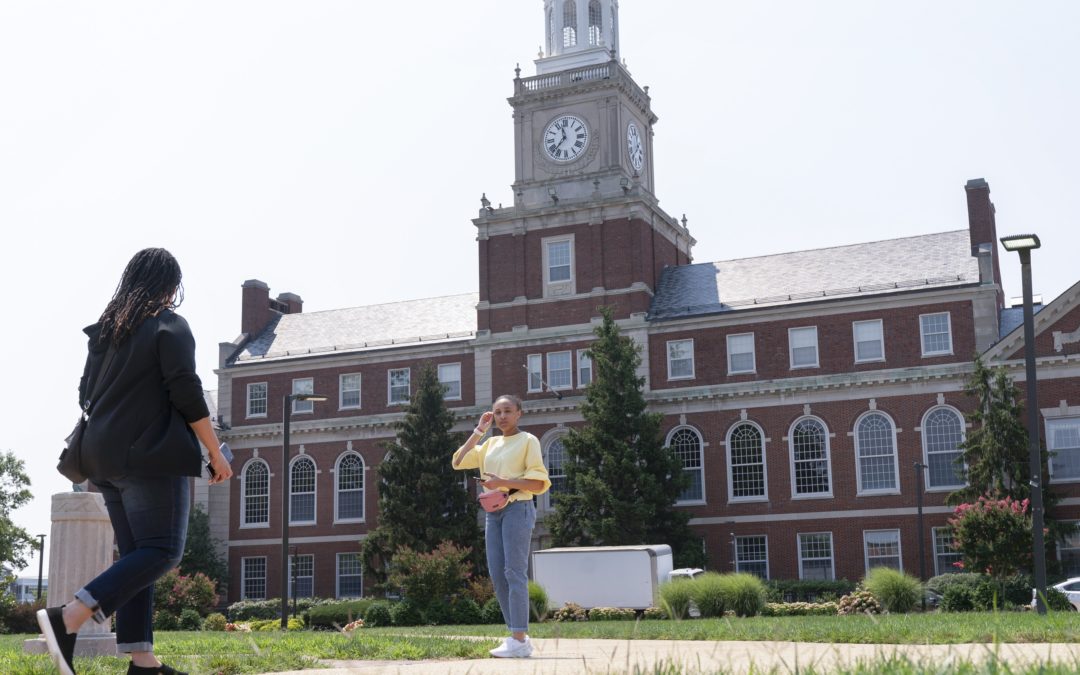
by Ashraf Khalil, AP | Jul 13, 2021 | Black History, Commentary, Headline News |
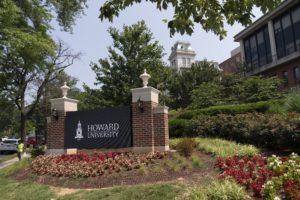
FILE – In this July 6, 2021, file photo, an electronic signboard welcomes people to the Howard University campus in Washington. With the surprise twin hiring of two of the country’s most prominent writers on race, Howard University is positioning itself as one of the primary centers of Black academic thought just as America struggles through a painful crossroads over historic racial injustice. (AP Photo/Jacquelyn Martin, File)
WASHINGTON (AP) — With the surprise twin hiring of two of the country’s most prominent writers on race, Howard University is positioning itself as one of the primary centers of Black academic thought just as America struggles through a painful crossroads over historic racial injustice.
But then, Howard University has never exactly been low-profile.
For more than a century, the predominantly Black institution in the nation’s capital has educated generations of Black political and cultural leaders. Among them: Supreme Court Justice Thurgood Marshall, civil rights icon Stokely Carmichael, Nobel laureate Toni Morrison and Vice President Kamala Harris.
But even by those standards, the school has been on a hot streak lately, with new funding streams, fresh cultural relevancy and high-profile faculty additions. This past week’s hiring of Nikole Hannah-Jones and Ta-Nehisi Coates serves as confirmation that Howard intends to dive neck-deep into America’s divisive racial debate.
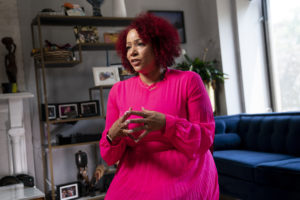
FILE – In this July 6, 2021, file photo Nikole Hannah-Jones is interviewed at her home in the Brooklyn borough of New York. Hannah-Jones opted against teaching at the University of North Carolina after a protracted tenure fight centered on conservative objections to her work and instead chose Howard University, where she will hold the Knight Chair in Race and Journalism. (AP Photo/John Minchillo, File)
Hannah-Jones opted against teaching at the University of North Carolina after a protracted tenure fight centered on conservative objections to her work and instead chose Howard, where she will hold the Knight Chair in Race and Journalism. She rose to fame with The New York Times’ “1619 Project,” which reframed U.S. history through a racial equity lens and helped mainstream the idea of critical race theory — a topic that has become a core Republican talking point.
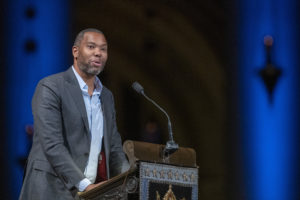
FILE – In this Nov. 21, 2019 file photo, author Ta-Nehisi Coates speaks during the Celebration of the Life of Toni Morrison at the Cathedral of St. John the Divine in New York. This past week’s hiring of Nikole Hannah-Jones and Coates serves as confirmation that Howard University intends to dive neck-deep into America’s divisive racial debate. (AP Photo/Mary Altaffer, File)
Coates has written critically on U.S. race relations for years and is closely associated with the argument for reparations for slavery.
Howard’s president, Wayne Frederick, doesn’t characterize either hiring as overtly political, but merely a natural extension of the university’s motivating ethos.
“Howard University has been on that caravan for social justice for about 154 years,” Frederick said in an interview. “Howard has a rich legacy. … My responsibility is to contemporize that and to bring faculty to the university who are in the contemporary space, speaking to present-day issues.”
Columbia University journalism professor Jelani Cobb, a Howard alumnus, described the moves as a pivotal jump in the university’s national stature. Howard, he said, had gone from traditionally “punching above its weight class” to “moving up a whole division.”
All this is just a few years removed from a period of internal tension and financial scandal. In 2018, six employees were fired amid revelations of more than $350,000 in misappropriated grant funding, and students staged a nine-day occupation of the administration building over demands that included better housing and an end to tuition increases.
But even amid those problems, Howard has seen a boost in applications and enrollment as more Black students choose to attend historically Black colleges and universities. “I do think that we’re seeing a renaissance, and that that’s driven by the students more than the parents,” said Noliwe Rooks, chair of Africana studies at Brown University. Rooks attended Spelman, an all-female HBCU in Atlanta.
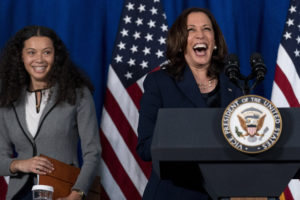
Howard University Student Association President Kylie Burke, left, introduces Vice President Kamala Harris to the podium to speaks about voting rights at Howard University in Washington, Thursday, July 8, 2021. (AP Photo/Andrew Harnik)
Vice President Harris returned to Howard days after the hirings were announced. Speaking at a news conference on a voters’ rights initiative sponsored by the Democratic National Committee, she received a rapturous welcome from a packed house that supplied church-style “amens” and burst into applause when she called Howard “a very important part of why I stand before you at this moment as vice president of the United States of America.”
For current students, the school’s rising profile is a confirmation of their choice to attend “The Mecca” — one of Howard’s many nicknames.
“There’s something truly intangible about this university,” said Kylie Burke, a political science major and president of the Howard Student Association, who introduced Harris at the event. Like Harris, Burke came from Northern California to attend Howard, and she served as a legislative fellow in Harris’ office when she was a senator. “Howard teaches you a thing about grit, it teaches you to remain focused, it teaches you to be persistent,” Burke said.
The hirings capped a dizzying stretch for Howard.
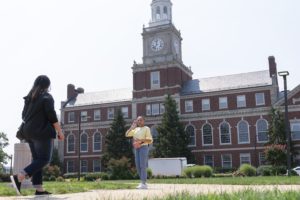
FILE – In this July 6, 2021, file photo with the Founders Library in the background, people walk along the Howard University campus in Washington. With the surprise twin hiring of two of the country’s most prominent writers on race, Howard University is positioning itself as one of the primary centers of Black academic thought just as America struggles through a painful crossroads over historic racial injustice. (AP Photo/Jacquelyn Martin, File)
Within the past year, Harris was elected vice president; MacKenzie Scott, ex-wife of Amazon founder Jeff Bezos, donated $40 million; and actor Phylicia Rashad returned to her alma mater as dean of the newly independent College of Fine Arts. That college will be named after the late Chadwick Boseman, a Howard graduate whose role as African superhero Black Panther made him an instant icon and shined a fresh cultural spotlight on the school.
Boseman expressed his love for the university in a 2018 commencement speech, calling it “a magical place.” He cited one of the school’s more modern nicknames, “Wakanda University,” a reference to the movie’s technologically advanced African utopia.
Although there’s rising interest across the HBCU network, Cobb said Howard will always attract a particular demographic of Black student such as Harris with an interest in politics and governance. The school has produced members of Congress, Cabinet secretaries and mayors. One of Cobb’s undergraduate classmates was Ras Baraka, now mayor of Newark, New Jersey.
Rooks said Hannah-Jones’ move could have ripple effects throughout academia.
Traditionally, Rooks said, Black academics were drawn to predominantly white universities because that’s where the funding and the prestige lay. But Hannah-Jones didn’t just bring her reputation; she also brought nearly $20 million in funding.
“It’s a whole other thing when you become the benefactor,” Rooks said. “We all learn how to behave, how to act, in the presence of power. If you’re the power and it’s your money, you’ve taken a whole racial dynamic off the table.”
Still, Howard’s rising prominence does bring the risk that it will overshadow smaller HBCUs. Rooks said Howard and a handful of other big names such as Morehouse, Spelman and Hampton dominate the headlines and the funding. She said, half-jokingly, that most Black American students couldn’t name more than 12 of the 107 HBCUs in the country.
One possible example of the phenomenon: In 2019, NBA star Steph Curry donated an undisclosed amount to allow Howard to launch Division I men’s and women’s golf teams, and fund them for six years. Curry was raised in North Carolina, home to 10 active HBCUs, and holds no particular connection to Howard.
The HBCU world still boils down to “five or six schools that really attract a lot of attention,” Rooks said, and dozens of others that are “desperate for funding.”
Howard’s recent fortune, she said, is “not necessarily going to raise all the boats.”
___
Associated Press writer Hilary Powell contributed to this report.
___
Follow Khalil on Twitter at www.twitter.com/ashrafkhalil

by Caroline Sumlin, Urban Faith Contributing Writer | Jul 9, 2021 | Headline News, Relationships |
Video Courtesy of Towanna Burrous
Back in the day, I used to watch this show called, Scrubs. Do you remember it? You know, Donald Faison and some other people? To be honest, I just watched the show for Donald Faison because he was from Clueless, and I loved the movie Clueless when I was younger. There was one thing I loved most about the show — the theme song. I love theme songs in general. Perhaps that makes me weird, but, whatever. Anyway, the theme song for Scrubs went like this:
I can’t do this all on my own. No, I’m no, I’m no superman.
I’m no superman.
I loved the song so much that I looked it up and put the full version on my iPod Nano. Remember those? I’m taking you back down memory lane, aren’t I? The song is by a band called Laslo Bane. I think I played that song at least 25 times a day when I was in high school. It really resonated with me because I was that girl who always felt like she needed to be superwoman. I thought that I needed to do it all, be it all, and do everything perfectly.
I know I’m not the only one who has ever felt this way.
I think part of the reason we tend to have this mentality is because our society tells us that we have to be perfect. Our society tells us that the key to success is to be “busy” and to run ourselves into the ground and to live off of coffee and little sleep. Our society makes us feel like we should be able to do everything perfectly and without help.
This is especially true in the Black community and even more true for us Black moms. This is especially, especially true for Black, Christian mamas. We strive to be the perfect Proverbs 31 woman, so we hold ourselves up to the highest standards and then pride ourselves into achieving those standards with absolutely no help. We are the keepers of the household, we are the makers of the meals, we are the cleaners of the spills, and we do it all without showing an ounce of our exhaustion. If we ask for help, we are viewed as weak and, of course, that is a no-no.
I became a mom 3 months ago, and now that I’m a mom, I have had many moments being trapped inside the “supermom mentality.” I was convinced I didn’t need help when my daughter was first born. I felt like I needed to do it all and I needed to be perfect while doing so.
It took me crying out to God in a state of exhaustion to realize that we put this mentality on ourselves. Who is telling us that we have to be supermom? Besides society and pressure from social media, there is no written document that states that we have to conform to this “supermom mentality.”
I’m here to tell you today that you don’t have to do it all. You don’t have to be supermom. That’s what the Holy Spirit is for! Our God is the One who wants to do it all and be it all for us.
“Each time he said, “My grace is all you need. My power works best in weakness.” So now I am glad to boast about my weaknesses, so that the power of Christ can work through me.” (2 Corinthians 12:9 NLT)
Do you see that? We GET to be weak. Holy Spirit wants us to! No more of this strong front, dear friend. Lean into Christ. Be weak. And let His grace be sufficient for you.
You may be thinking, I hear what you’re saying, but how? I just can’t let myself be weak, or I don’t know where to start!
Girl, I hear you. Let’s talk about it.
Ask the Lord for help
It sounds simple, but of course it isn’t. Hear me out. It can be hard to ask someone else for help. Personally, I don’t want to impose or inconvenience someone, so I just try to do everything by myself. When I had my daughter, I didn’t ask anyone for help except my husband. But, The Lord knew that I needed so much help as a sleep deprived, postpartum mama. He sent me help that I could not refuse. I would receive text messages from faithful friends telling me that they were on the way over to drop off some food. I didn’t have to ask them for the very thing I needed. Holy Spirit guided them to help me when I needed it the most. All I had to do was receive it with open arms and be thankful. When you ask God for help, He will meet you where you are and send you help just as you need it.
Lean on your spouse and loved ones
Mamas, your spouse and loved ones are there for you. They WANT to help and your partner NEEDS bonding time with his child, too. And, of course, your family and friends enjoy spending time with the little ones as well. I know it can be hard to not be the overbearing, overprotective mama bear. Trust me. I’m guilty of this, myself. I have a tendency to hover over my husband instead of just letting him have his time with our little one. Hello? I should be napping as soon as he gets home and takes her! Why do I feel the need to keep hovering? Better yet, why do I feel the need to ask myself, “What needs to be done now?” instead of taking the opportunity to rest. Now, I’m not discouraging productivity, but there is nothing wrong with saying, “no” to those dishes and taking time to recharge when you can.
Also, just talk to your spouse about how you’re feeling. Don’t keep it in. He doesn’t expect you to be supermom, I promise.
Say yes to what matters
Everything is not created equal. As women, and especially as moms, we often say yes to everything. We try to do everything and do it all well. Then, when we get burned out and realize that our efforts created mediocre results. We need to learn to only tackle things that truly matter on a daily basis. For me, that sometimes means putting aside working on the budget to help my stepson with homework. Or, that might mean saying yes to quality time with my spouse and saving that phone call for tomorrow. When we choose just a few things to focus on and do well instead of loading our plates with all of the things, we won’t feel so stretched thin and the “supermom mentality” will fade.
Mamas, we need to realize that our spouse and kids are who’s important. Not what society expects of us, not what we see other moms posting on social media, not what our friends are doing with their kids, etc. Our kids don’t care if our hair is messy or if the house is clean. Our spouse doesn’t care if our kids are perfectly dressed or if we were able to finish that load of laundry today. Our spouses love us and our kids just need us. They beautifully accept us as we are. In their eyes, we are their supermoms. And I know that I don’t have to finish all of the chores for my husband to see me as a “superwife.”
Jesus loves us the same way. He meets us right where we are and gives us grace. We have nothing to prove. Nothing.
Now, go take a deep breath and hug your kiddos. They love you.
Do you have additional tips for today’s busy moms? Share them below.
 Summer is in full swing, and people all across the country have fired up their grills, purchased their summer wardrobes, and started traveling. For Black folks, summer often means family reunions (especially after the pandemic lockdown), barbecues (cookouts/kickbacks/get-togethers/BBQs), and finding things for the kids to do (like sports, activities, or playing outside). We all look forward to summer vacations, summer hours, and summer…denominational general conferences?
Summer is in full swing, and people all across the country have fired up their grills, purchased their summer wardrobes, and started traveling. For Black folks, summer often means family reunions (especially after the pandemic lockdown), barbecues (cookouts/kickbacks/get-togethers/BBQs), and finding things for the kids to do (like sports, activities, or playing outside). We all look forward to summer vacations, summer hours, and summer…denominational general conferences? Well, we are actually doing exactly what the Bible says. The Bible is where we find the church resolving debates over contemporary issues and developing administration together in Acts 6, the commissioning of Barnabas and Paul (Saul) in Acts 13, and the first church-wide conference at Jerusalem in Acts 15. At that conference, the Gospel was articulated for Gentiles. Plus, we see Apollos teaching right doctrine after meeting with Priscilla and Aquila in Acts 18. There is no law in scripture for every situation, especially as the world changes and God continues calling us to follow Him. We need a relationship with God and the power of the Holy Spirit to lead us into all truth. It was the Pharisees and Sadducees who believed they could keep the letter of the law perfectly and had no need for God’s Spirit to lead them.
Well, we are actually doing exactly what the Bible says. The Bible is where we find the church resolving debates over contemporary issues and developing administration together in Acts 6, the commissioning of Barnabas and Paul (Saul) in Acts 13, and the first church-wide conference at Jerusalem in Acts 15. At that conference, the Gospel was articulated for Gentiles. Plus, we see Apollos teaching right doctrine after meeting with Priscilla and Aquila in Acts 18. There is no law in scripture for every situation, especially as the world changes and God continues calling us to follow Him. We need a relationship with God and the power of the Holy Spirit to lead us into all truth. It was the Pharisees and Sadducees who believed they could keep the letter of the law perfectly and had no need for God’s Spirit to lead them.

 It could be daunting to take over the reins as lead pastor for a church your famous parents planted in 2012, but for Alvin Love III, 35, it was a natural progression that was initially inspired by a powerful encounter he had on a visit to Melbourne Life Church in Australia.
It could be daunting to take over the reins as lead pastor for a church your famous parents planted in 2012, but for Alvin Love III, 35, it was a natural progression that was initially inspired by a powerful encounter he had on a visit to Melbourne Life Church in Australia. So what does he believe they should be focused on? What Love says are the “basic beliefs — being a community of faith amidst the social, health, and political unrest. They had to do things a little differently with COVID. Previously, they’d gather more with 12-week small groups. Now, they’re focused on being a source of life and faith for people wherever they are, whether at work, in the neighborhood, or elsewhere. He encourages his members to reach out to people who aren’t part of their church community, or perhaps they’re at the edge of not believing at all.
So what does he believe they should be focused on? What Love says are the “basic beliefs — being a community of faith amidst the social, health, and political unrest. They had to do things a little differently with COVID. Previously, they’d gather more with 12-week small groups. Now, they’re focused on being a source of life and faith for people wherever they are, whether at work, in the neighborhood, or elsewhere. He encourages his members to reach out to people who aren’t part of their church community, or perhaps they’re at the edge of not believing at all.





